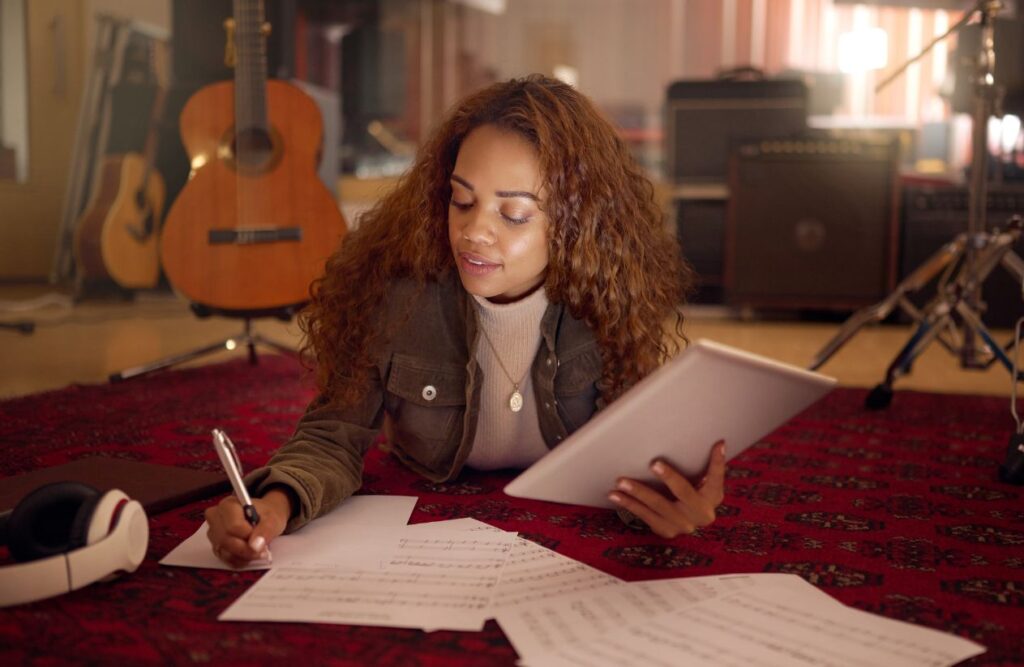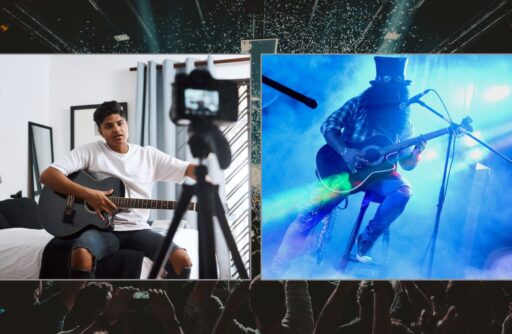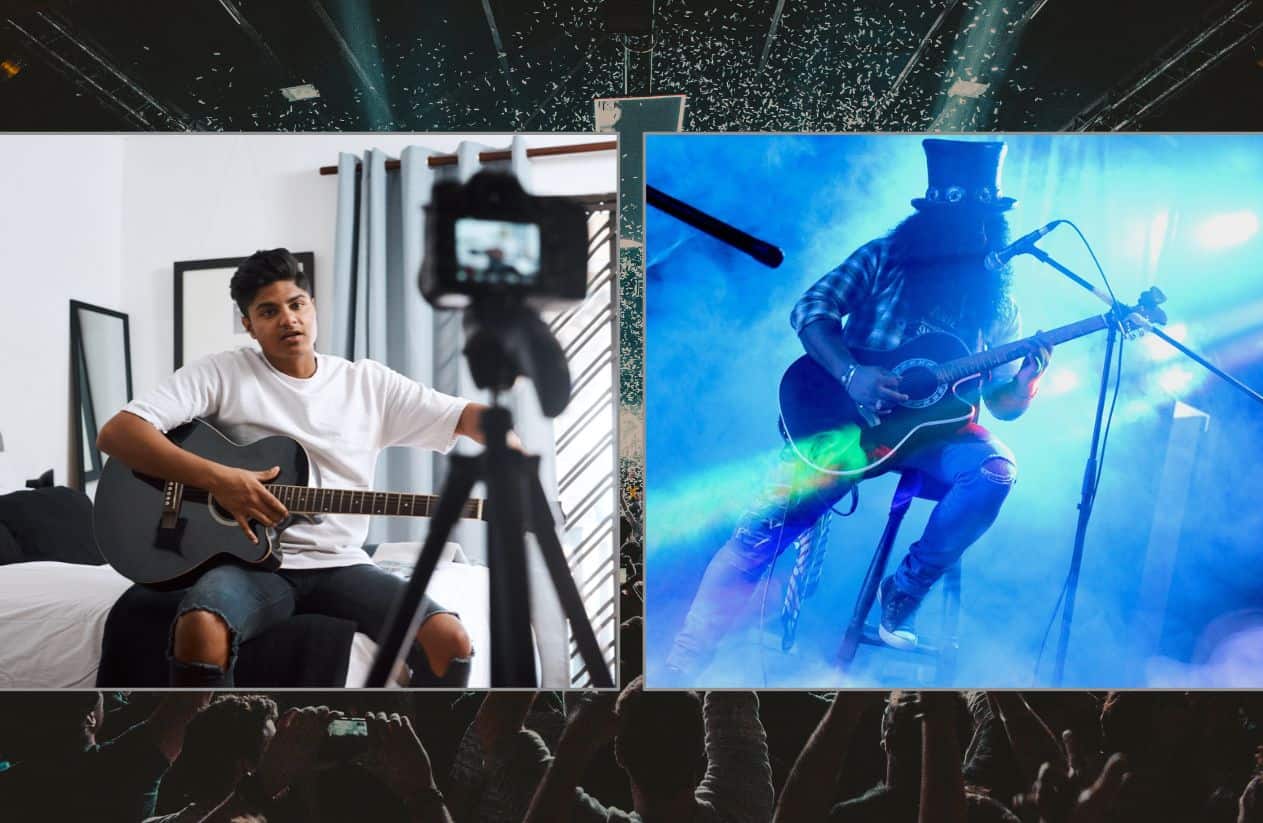Have you ever witnessed a dance floor fall silent, the energy of an event plummeting because the music simply didn’t connect? Or perhaps you’ve experienced the electric thrill of a packed room singing along, completely immersed in the perfect soundtrack?
The power of music to make or break an event is undeniable. For event planners, a crucial decision lies in selecting the right melodies: should they fill the air with familiar covers vs originals?
This guide serves as your comprehensive framework to navigate this very dilemma. We’ll delve into understanding your audience’s unique tastes, ensuring your musical choices align seamlessly with your event’s theme, navigating the often-complex legal landscape, and mastering the art of blending covers vs originals for an unforgettable experience.
By the end, you’ll be equipped to make informed decisions that strike the perfect chord for your next event’s success.
Setting the Stage: Why Music is the Soul of Your Event

Imagine stepping into an event and instantly feeling a certain way – energized, sentimental, or ready to celebrate. That feeling is often sparked by the music.
It’s remarkable how a familiar pop song can flood a room with joy, or how a soulful melody can evoke a shared sense of nostalgia. The rhythmic beat of dance music can ignite an electric atmosphere, while gentler tunes create a space for comfortable connection.
This inherent power of music is why it truly acts as the soul of any gathering.
Consider a corporate event aiming for a sophisticated yet engaging environment; the carefully chosen music sets the tone for productive interactions.
A social gathering thrives on a vibrant soundtrack that encourages people to connect and enjoy themselves. And for those milestone celebrations, the right music amplifies the joy and significance of the occasion.
Thoughtful music selection, particularly when deciding between covers vs originals for events, isn’t just about filling the silence; it’s a strategic element that shapes the entire guest experience and plays a vital role in achieving your event’s core objectives.
Decoding Your Audience: The Foundation of Your Musical Choices

Choosing the right music for your event isn’t about picking your favorite tunes; it’s about understanding the musical DNA of your audience. Think of it as the bedrock upon which a successful event soundtrack is built.
Go Beyond the Surface: Understanding Psychographics
Forget just age and job titles. To truly connect through music, delve into your audience’s psychographics. Consider:
- Interests: What are their hobbies? What kind of content do they consume? Someone passionate about vintage culture might appreciate retro covers, while a group focused on innovation could be more receptive to cutting-edge original music.
- Lifestyle: Are they generally high-energy and outgoing, or more laid-back and contemplative? This can influence their preference for upbeat dance tracks versus more mellow acoustic sets.
- Values: What’s important to them? Do they appreciate authenticity and supporting independent artists (leaning towards originals)? Or do they value familiarity and shared experiences (making covers a strong choice)?
Practical Steps to Uncover Musical Preferences:
Turn your audience into your music consultants! Here’s how:
- Pre-Event Surveys: Simple online polls asking about favorite genres, artists, or even eras of music can provide valuable quantitative data. For more in-depth insights, consider open-ended questions like, “What kind of music makes you want to dance/relax/network?”
- Social Media Engagement: Use interactive polls on platforms like Instagram or Twitter. Ask fun questions related to music styles or even pit covers against originals in hypothetical scenarios related to your event.
- Analyze Past Event Feedback: If you’ve organized similar events, revisit feedback forms. Were there any comments about the music? What songs seemed to get the best reaction?
- Observe and Listen: If possible, consider the typical atmosphere and music played in places your target audience frequents. This can offer subtle clues about their general tastes.
Turning Data into Musical Gold:
Once you’ve gathered information, look for recurring themes. Are there clear favorite genres? Is there a generational divide in preferences? Use this analysis to:
- Identify Core Preferences: Pinpoint the musical styles that resonate most strongly with the majority of your audience.
- Recognize Potential Overlaps: Look for genres or artists that have broad appeal across different audience segments.
- Spot Niche Interests: While you can’t cater to every single individual, understanding niche interests can help you sprinkle in a few well-chosen tracks that surprise and delight.
Tackling the Diverse Audience Challenge:
It’s rare to have an audience with identical musical tastes. Here’s how to navigate that:
- Strategic Genre Blending: Incorporate a variety of genres throughout the event, ensuring different segments of your audience get moments to connect with the music.
- Familiarity First: Start with well-known covers to create an initial sense of comfort and energy, then gradually introduce original tracks or less mainstream covers.
- Tempo and Energy Shifts: Vary the tempo and energy levels of the music to cater to different moods and activities throughout the event.
- Consider Requests (Wisely): If appropriate for your event’s formality, allowing a limited number of well-placed requests can make guests feel heard and engaged.
By investing time in understanding your audience’s musical DNA, you lay a solid foundation for choosing the perfect blend of covers and originals that will resonate deeply and contribute to a truly unforgettable event.
Related Content: Edmonton’s Top Bands for Your Next Event
Aligning the Soundtrack with Your Event’s Narrative

Think of your event as a story, and the music as its underlying score. The right soundtrack, carefully chosen with the covers vs originals decision in mind, can amplify the narrative, immerse your guests, and drive home your key messages. Here’s how to make your music choices a powerful storytelling tool:
Matching Music to the Theme: Concrete Examples You Can Use
- Roaring Twenties Party: Think flapper dresses and art deco. Lively jazz covers of popular tunes from the era, or even original compositions in that classic style, will instantly transport your guests.
- Tropical Beach Bash: Upbeat reggae or Latin-inspired covers of familiar songs create a relaxed and festive vibe. Consider sprinkling in some authentic original tracks from these genres for added flavor.
- Sci-Fi Convention: Embrace futuristic and atmospheric original electronic music. While some instrumental covers of popular movie themes might work, prioritize unique sounds that align with the genre.
- Formal Charity Auction: Elegant classical music covers or sophisticated instrumental originals provide a refined backdrop during bidding. Transition to more uplifting (but still tasteful) covers as the event progresses towards celebration.
Reinforcing Your Message and Brand Through Sound:
- Brand Values: If your brand emphasizes innovation, showcasing original music from emerging artists can reinforce that message. If your brand is built on tradition and trust, familiar covers might create a sense of comfort and reliability.
- Event Goals: For a networking event, choose music that encourages conversation (think lower volume, instrumental versions, or softer genres). For a product launch emphasizing excitement, high-energy covers or impactful original tracks can build anticipation.
Strategic Music Selection for Different Event Phases:
Think about the guest journey and how music can enhance each stage:
- Arrival: Play welcoming and approachable music (often familiar covers) to set a positive first impression and ease guests into the event.
- Mingling/Cocktail Hour: Opt for background music that facilitates conversation – think softer covers, instrumental versions, or less intense originals.
- Keynote/Presentations: Music during these moments should be minimal or carefully chosen to build anticipation or provide a subtle underscore without being distracting.
- Main Activities (e.g., Dinner, Entertainment): Tailor the music directly to the activity. Upbeat and engaging for dancing, more sophisticated and ambient for dining.
- Departure: End on a high note with feel-good covers or memorable originals that leave a lasting positive impression.
By consciously connecting your music choices to the overarching narrative of your event, you move beyond simply filling the silence and creating a truly immersive and impactful experience for your attendees.
The Allure of Familiarity: Leveraging Cover Songs Effectively

There’s a unique power in hearing a beloved song. Cover songs tap directly into this familiarity, offering a multitude of benefits for your event. The instant recognition of a well-known tune can immediately engage your audience, creating a sense of comfort and shared experience.
When people recognize a song, they’re more likely to sing along, tap their feet, and feel connected to the music and those around them. This familiarity naturally fosters a comfortable and engaging atmosphere, making it easier for guests to socialize, relax, and ultimately, hit the dance floor.
Furthermore, cover songs often carry a strong nostalgia factor. A hit from a specific era can transport attendees back to cherished memories, creating an emotional connection that transcends age.
For multi-generational events, strategically chosen covers can bridge the gap between different age groups, offering something familiar and enjoyable for everyone.
A classic rock anthem might get older guests reminiscing, while a 90s pop hit could resonate with a younger crowd, creating moments of shared enthusiasm.
However, simply playing any cover song won’t guarantee success. Here are some crucial tips for selecting the right cover songs:
- Choose Wisely: Opt for songs that are genuinely well-known and generally well-liked by a broad audience. Avoid obscure tracks or deep cuts that might only resonate with a small segment. Think about songs that have stood the test of time and have a proven track record of getting people moving or singing.
- Quality Matters: The quality and style of the cover performance are paramount. A poorly executed cover can fall flat, even if the original is a hit. Ensure that the musicians you hire deliver polished and engaging renditions that do justice to the original while bringing their own flair. Consider their vocal abilities, instrumental skills, and overall stage presence.
- Avoid Overexposure: Be mindful of overplayed covers that guests might be tired of hearing. While familiarity is good, excessive repetition can lead to fatigue. Also, ensure the chosen covers are genre-appropriate for your event’s overall theme and atmosphere. A heavy metal cover might feel out of place at an elegant cocktail reception.
To truly elevate your event, explore creative ways to present covers:
- Unique Arrangements: Encourage your performers to put their own spin on familiar songs. A slowed-down acoustic version of an upbeat pop hit or a bluesy rendition of a rock classic can offer a fresh and intriguing perspective.
- Themed Medleys: Create medleys of popular songs from a specific era or genre. This keeps the energy high and offers a rapid-fire dose of recognizable tunes.
- Interactive Performances: Some bands excel at taking requests or incorporating audience participation into their cover sets, creating a more dynamic and memorable experience.
By thoughtfully selecting and creatively presenting cover songs, you can harness the power of familiarity to create a lively, engaging, and ultimately unforgettable event for your guests.
The Power of Originality: Creating Unique and Memorable Experiences

While the comfort of familiar covers has its place, featuring original music injects a unique and memorable element into your event, setting it apart from the standard fare.
By showcasing original compositions, you actively contribute to creating a distinct identity for your gathering. Instead of an experience built on recognizable melodies from other artists, your event becomes associated with a specific sound and artistic vision.
Furthermore, incorporating original music provides a valuable platform for showcasing artistic talent and supporting independent musicians. This can add a layer of cultural richness and authenticity to your event.
Guests often appreciate the opportunity to discover new music and connect with artists who are passionate about their craft. This can leave a lasting positive impression, associating your event with creativity and support for the arts.
Introducing original music can also spark a sense of discovery and intrigue for the audience. While covers offer familiarity, original tracks offer a fresh listening experience.
This can captivate your guests, encouraging them to pay closer attention and engage with the music on a different level. It can be a talking point, something that makes your event stand out in their memories.
When considering featuring original music, keep the following guidance in mind:
- Prioritize Quality: Just like with covers, ensuring the quality and professionalism of the performance is crucial. The musicians should be skilled, their sound well-produced, and their stage presence engaging. A poorly performed original song, no matter how creative, can detract from the overall experience.
- Theme and Audience Alignment: Carefully consider whether the genre and style of the original music align with your event’s theme and the preferences of your audience. Avant-garde jazz might not be the best fit for a mainstream corporate event, just as heavy metal originals might not suit a relaxed garden party.
- Support Local Talent: Potentially incorporating local or emerging artists can add a unique and community-focused touch to your event. This not only provides exposure for talented individuals but can also resonate positively with attendees who appreciate supporting local culture.
Effectively introducing original music to an audience familiar with covers requires a thoughtful approach:
- Strategic Placement: Don’t start with a full set of unfamiliar originals. Consider interspersing original tracks between well-known covers. This allows the audience to ease into new sounds within a comfortable context.
- Brief Introductions: Encourage the artists to briefly introduce their original songs, perhaps sharing a little about the inspiration or the genre. This can help the audience connect with the music on a more personal level.
- Genre Pairing: Try to pair original songs with covers that share a similar vibe or genre. This creates a smoother transition and helps the audience find a familiar entry point into the new music.
- Highlight Uniqueness: If the original music has a particularly catchy melody or a unique sound, point that out. Help your audience appreciate what makes it special.
By strategically incorporating high-quality original music that aligns with your event’s atmosphere, you can create a truly distinctive and memorable experience that goes beyond the expected.
The Art of the Blend: Crafting a Dynamic Playlist

Creating a truly captivating event soundtrack often involves skillfully weaving together the familiarity of cover songs with the freshness of original compositions.
The goal is to craft a dynamic playlist that keeps your audience engaged, entertained, and leaves them with a lasting impression. Here are practical strategies for seamlessly integrating these two musical worlds:
Strategic Integration Techniques:
- Start with the Familiar: Begin your event’s musical journey with well-known and energetic cover songs. This serves as an immediate invitation for your audience to connect with the music, sing along, and get comfortable. It establishes a positive and engaging atmosphere right from the start.
- Weave in Originals Thoughtfully: Once the audience is engaged, strategically introduce original tracks. Consider placing them between sets of popular covers or after a particularly high-energy cover song. This allows the new music to be heard within a context of familiarity. Think of it as offering a new flavor within a comforting meal.
- Tempo and Energy as Your Guide: Pay close attention to the tempo and energy flow of your playlist. Transitioning from a high-energy cover to a similarly paced original, or vice versa, can create a smoother and more cohesive listening experience. Avoid jarring shifts in mood or energy that might disengage the audience.
- Seamless Transitions are Key: Ensure smooth transitions between songs, whether they are covers or originals. This can be achieved through beatmatching (if using a DJ), natural segues by a live band, or carefully curated fades and crossfades in a pre-recorded playlist. A seamless flow prevents the music from feeling disjointed and maintains the overall momentum of the event.
Examples of Successful Cover/Original Blends:
- Corporate Networking Event: Start with instrumental covers of popular songs to create a sophisticated backdrop for conversation. Interweave original instrumental pieces with a similar vibe to maintain the atmosphere while showcasing unique artistry. Later in the event, if the atmosphere becomes more relaxed, introduce acoustic covers and perhaps some mellow original songs from local singer-songwriters.
- Wedding Reception: Begin with classic love song covers during the cocktail hour and dinner. As the dancing begins, transition to more upbeat and familiar dance covers. Sprinkle in a few well-received original songs from the hired band that align with the celebratory mood. The band might even perform a special original song written for the couple.
- Music Festival Featuring Multiple Artists: Curate sets where headliners primarily perform their original material, building anticipation and showcasing their signature sound. Support acts can strategically blend well-known covers with their original songs to engage a broader audience and introduce them to their own music.
- Themed Party (e.g., 80s Night with a Live Band): The majority of the setlist will likely consist of energetic 80s covers. However, the band could incorporate a few original songs that are heavily influenced by the 80s sound, adding a unique twist while still fitting the overall theme.
The Importance of Flexibility:
Remember that even the most meticulously planned playlist might need adjustments based on the real-time reactions of your audience. Pay attention to their energy levels, engagement, and any non-verbal cues. Be prepared to:
- Extend a well-received set of covers.
- Swap out a less engaging original track for a familiar favorite.
- Adjust the tempo or genre based on the mood of the room.
Having a flexible approach and being responsive to your audience’s energy will ultimately lead to a more successful and enjoyable event for everyone.

Understanding the legalities surrounding music performance is crucial for any event planner. Copyright law protects the rights of songwriters and publishers, granting them control over how their musical works are used.
When it comes to your event, this means you need to consider licensing for both cover songs and original music to avoid potential legal repercussions.
At its core, copyright law gives creators exclusive rights to their original works, including the right to reproduce, distribute, perform publicly, and create derivative works. For event music, the primary concern is public performance.
Demystifying Mechanical Licenses for Cover Songs:
When you want to reproduce and distribute a copyrighted song (like creating a recording), you typically need a mechanical license.
For instance, in Canada, the Canadian Musical Reproduction Rights Agency Ltd. (CMRRA) is a key organization that issues these licenses. Websites can also simplify this process.
Keep in mind that fees vary depending on how the recording will be used.
Understanding Performance Rights Organizations (PROs):
For live performances of copyrighted music (both covers and originals), Performance Rights Organizations (PROs) play a vital role.
These organizations represent songwriters and publishers by licensing the public performance rights of their music. They collect royalties from venues and event organizers and distribute them to their members.
Responsibility for Blanket Licenses:
Often, the venue where your event is held will have blanket licenses with the major PROs. These licenses allow the venue to host events featuring virtually any song in the PRO’s repertoire.
As an event organizer, it’s crucial to confirm with the venue management whether they have these licenses in place and if they cover the type of musical performances you are planning.
If the venue does not have the necessary blanket licenses, or if you are organizing an event in a non-traditional space, the event organizer is typically responsible for obtaining these licenses directly from the PROs.
Blanket licenses usually cover the performance of any song within the PRO’s catalog for a specific period. The cost of these licenses varies based on factors like the venue capacity and the type of event.
For example, in Canada, event organizers would typically need to secure licenses from organizations like SOCAN and Re:Sound.
Legal Considerations for Performing Original Music:
While performing original music might seem simpler, there are still legal considerations. If the performing artist is the sole songwriter and owns all the rights to their music, they generally have the right to perform it live.
However, it’s essential to have a clear artist agreement that outlines the terms of the performance, including who owns the rights to any recordings made at the event.
If the artist has assigned their publishing rights to a music publisher, the publisher also has a stake in how the music is performed publicly. PROs also license the performance rights for original songs represented by publishers.
Therefore, even when featuring original music, it’s good practice to ensure that performing artists have their rights in order and understand their obligations.
Actionable Advice for Legal Compliance:
- Confirm Venue Licensing: Always check with the venue about their PRO licenses. Get confirmation in writing if possible.
- Obtain Necessary Licenses: If the venue doesn’t have adequate coverage, contact the relevant PROs to obtain blanket licenses for your event.
- Understand Artist Agreements: For original music performances, have clear agreements with the artists regarding performance rights and ownership of any recordings.
- Be Transparent: If you are unsure about any aspect of music licensing, consult with legal professionals specializing in entertainment law.
- Budget for Licensing Fees: Factor music licensing costs into your event budget.
By proactively addressing these legal considerations, you can ensure your event runs smoothly and avoid potential copyright infringement issues and penalties.
You can also read our article “Booking Entertainment for Events: Essential Tips and Tricks”
Conclusion
In the world of event planning, music stands as a cornerstone of the overall experience. Thoughtful selection, especially when navigating the choices between covers vs originals, is paramount in crafting truly unforgettable moments for your attendees.
This guide has explored the critical aspects of understanding your audience, aligning music with your event’s narrative, appreciating the power of both familiar and novel sounds, mastering the art of blending playlists, and navigating the essential legal landscape.
By strategically considering these elements, you can move beyond simply filling the silence and instead create a vibrant, engaging atmosphere that resonates deeply with your guests.
So, take these insights and start planning your perfect soundtrack today, transforming your next event into an extraordinary and memorable occasion.
Looking for a band to hire for your event? We got it for you, below is the list of bands that we recommend that you book or hire for the event:
Covers VS Originals- FAQ Section
When planning an event, selecting the right music can significantly enhance the ambiance and overall experience for your guests.
Here, we tackle some frequently asked questions to help you navigate the complexities of choosing between cover songs and originals for your event.
How Do I Decide Between Cover Songs and Original Music?
The choice between cover songs and original music largely depends on the theme and audience of your event. Consider the demographics and preferences of your audience, the tone you wish to set, and whether your priority is interaction or creating a distinctive atmosphere.
What Should I Consider When Hiring Musicians?
For cover songs, look for versatile performers who can adapt to various styles and engage a wide audience. If opting for original music, seek artists whose vision aligns with the essence of your event and who have a proven track record of captivating live performances.
How Can I Balance Covers and Originals Effectively?
Balancing cover songs with original music requires a nuanced understanding of your event’s flow and audience engagement levels. A good strategy is to start with cover songs to warm up the crowd and gradually introduce originals as the event progresses.






